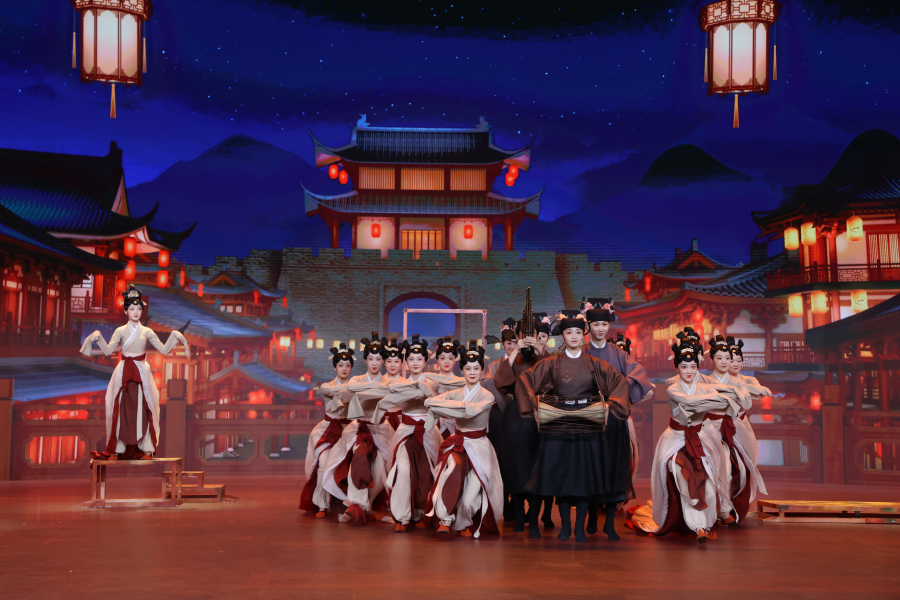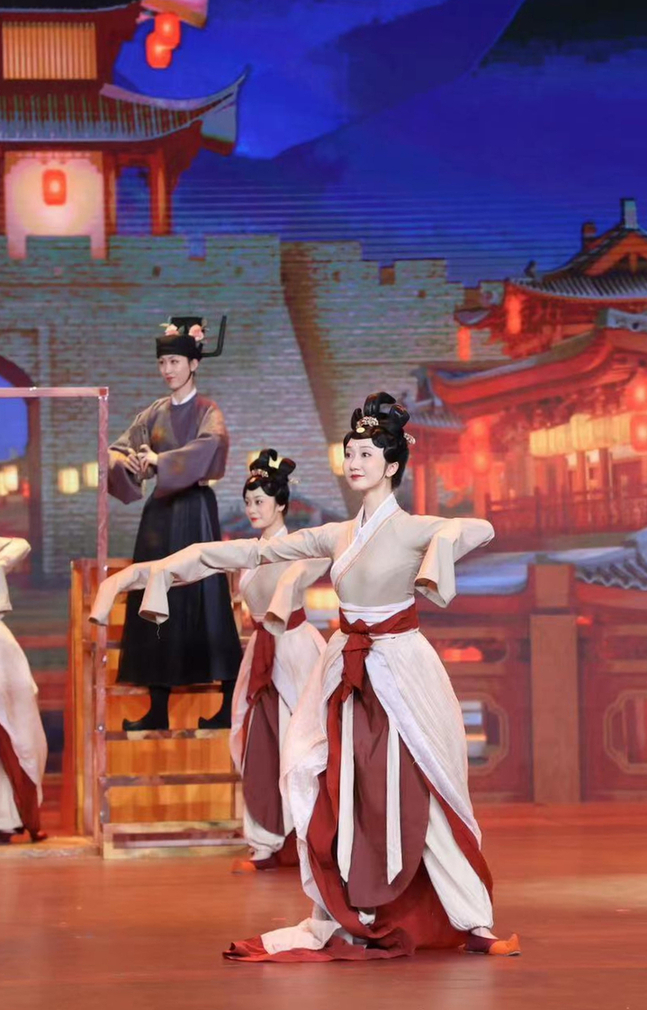

In every step and gesture of the dance drama “Diverse Ensemble,” we are conversing with history and reviving the unique charm of Liao Dynasty culture. As dancers, we do more than showcase the beauty of movement – we appreciate, understand, and bring to life the distinctive folk traditions and social ethos of that era.

Photo of the dance performance "Diverse Ensemble". (Photo provided to Guangming Online)
From Stillness to Motion: “Revitalizing” Dance from Murals
The creation of “Diverse Ensemble” draws inspiration from the eponymous mural of the Liao Dynasty, which depicts “san yue” – the primary form of music and dance during that time. The mural captures scenes of flourishing musical and folk culture, whereas our task was to transform this two-dimensional artwork into a dynamic dance performance, bringing it from flatness to depth, from stillness to motion. While this process was fraught with challenges, it offered a rare opportunity to delve deep into the culture of Liao.
In the past, the dance styles we were acquainted with primarily were rooted in the Tang and Han Dynasties, leaving our understanding of Liao dance relatively limited. To authentically portray this style, the choreographer invited experts and scholars to lecture us on the history and culture of the Liao period, through which I learned that Liao music and dance culture had distinct ethnic characteristics. The movements of Liao dancers were described as “abrupt yet restrained, with a focus on concise, retractable gestures.” Consequently, we eschewed the elongated, graceful lines typical of our previous dances, emphasizing instead strength and rhythm. Movements were concentrated around the chest and face, imbued with a distinct sense of contraction and expansion, reflecting the ruggedness and primal simplicity unique to the Khitans.
Additionally, visiting museums of murals and paintings from the Liao Dynasty left a lasting impression on me. The depictions of figures, along with their unique hairstyles and ornaments, brimming with regional flavor, conveyed the joyful, simple, and vivid emotions of the people of Liao. In our performance, we sought to infuse each movement with this lively spirit to demonstrate the uninhibited, straightforward, and exuberant character of the nomadic Khitans.

Photo of Wang Jiangyuemeng in the dance performance "Diverse Ensemble". (Photo provided to Guangming Online)
Harmony of Dance and Music: A “Concerto” Between Dancers and Musicians
One of the most moving aspects of “Diverse Ensemble” is the profound collaboration between dancers and musicians. The clapper player, acting as a conductor, sets the rhythm with each strike of the clapper, signaling the dancers’ movements. Following these cues, we synchronize precisely with the musicians’ actions and rhythms. Like a symphony orchestra, each of our movements becomes part of a shared melody, presenting a harmonious rhythm that resonates across the stage.
Through this form of performance, the ensemble unfolds in a seamless fusion of music and dance, rich with scenes of singing and movement. Each dance segment embodies its own theme and characteristics, linked naturally through emotional transitions. To sum it up, the work showcases “abrupt rhythm” of intense beats and strength; “flight,” symbolizing the soaring motions inspired by the eagle totem of the Liao; and “stillness,” the return to tranquility after the dance’s lively crescendo. The performance concludes as our movements freeze in an instant, recreating the scene in the mural and leaving ample room for the audience’s reflection and imagination.
“Diverse Ensemble” allowed me to experience the unique allure of Liao music and dance. Every movement on stage embodies the pursuit and exploration of historical culture. It is not merely a dance performance. Rather, it’s a revival of culture and history, as each motion was a de facto dialogue with the past and its enduring legacy.
Contributed by Wang Jiangyuemeng, Performer in Diverse Ensemble
点击右上角![]() 微信好友
微信好友
 朋友圈
朋友圈

请使用浏览器分享功能进行分享
